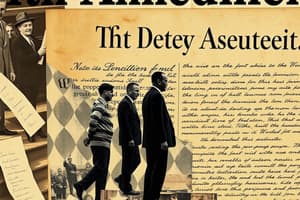Podcast
Questions and Answers
What does the 24th Amendment to the U.S. Constitution prohibit?
What does the 24th Amendment to the U.S. Constitution prohibit?
- Denying access to voting based on failure to pay a poll tax (correct)
- Denying access to voting based on residency
- Denying access to voting based on age
- Denying access to voting based on educational qualification
When was the 24th Amendment ratified?
When was the 24th Amendment ratified?
- March 15, 1922
- July 4, 1776
- December 7, 1941
- January 23, 1964 (correct)
What is the main purpose of the 24th Amendment?
What is the main purpose of the 24th Amendment?
- Protecting the right to vote against discrimination based on economic status (correct)
- Establishing a minimum voting age
- Guaranteeing universal suffrage
- Ensuring fair representation in Congress
What is a poll tax?
What is a poll tax?
During which historical period did the implementation of poll taxes become particularly controversial in the southern United States?
During which historical period did the implementation of poll taxes become particularly controversial in the southern United States?
What does the 24th Amendment protect the right to vote against?
What does the 24th Amendment protect the right to vote against?
What does Section 2 of the 24th Amendment empower?
What does Section 2 of the 24th Amendment empower?
What was the purpose of the poll tax in southern states?
What was the purpose of the poll tax in southern states?
Which constitutional amendment outlawed the practice of poll taxes nationwide?
Which constitutional amendment outlawed the practice of poll taxes nationwide?
What was the impact of the poll tax on the African American population?
What was the impact of the poll tax on the African American population?
Which legislative action was part of the federal government's response to Jim Crow laws?
Which legislative action was part of the federal government's response to Jim Crow laws?
What was the primary purpose of the Civil Rights Acts of 1957, 1960, 1964, and 1968?
What was the primary purpose of the Civil Rights Acts of 1957, 1960, 1964, and 1968?
Which constitutional amendment granted citizenship and fundamental rights to those formerly enslaved?
Which constitutional amendment granted citizenship and fundamental rights to those formerly enslaved?
What was the purpose of the 15th Amendment?
What was the purpose of the 15th Amendment?
What was the role of the 13th Amendment?
What was the role of the 13th Amendment?
Flashcards are hidden until you start studying
Study Notes
The 24th Amendment
- Prohibits the federal government and states from requiring payment of a poll tax as a condition of voting in federal elections.
- Ratified on January 23, 1964.
Poll Tax
- A fee charged to voters, typically in federal elections.
- Implemented in southern states, particularly during the late 19th and early 20th centuries, as a way to disenfranchise African Americans and poor whites.
Impact of Poll Tax
- Disproportionately affected African Americans, limiting their access to the ballot box.
- Part of the broader system of Jim Crow laws, aimed at suppressing African American political power.
Purpose of the 24th Amendment
- Protected the right to vote against the financial burden of poll taxes.
- Aimed to ensure that voting rights are not contingent on an individual's financial situation.
Section 2 of the 24th Amendment
- Empowers Congress to enforce the amendment through legislation.
Civil Rights Legislation
- The Civil Rights Acts of 1957, 1960, 1964, and 1968 were part of the federal government's response to Jim Crow laws.
- Primary purpose: to protect the civil and political rights of African Americans.
13th, 15th, and 24th Amendments
- The 13th Amendment (1865) abolished slavery.
- The 15th Amendment (1870) granted citizenship and fundamental rights to formerly enslaved people.
- The 24th Amendment (1964) outlawed poll taxes nationwide, further protecting voting rights.
Studying That Suits You
Use AI to generate personalized quizzes and flashcards to suit your learning preferences.




